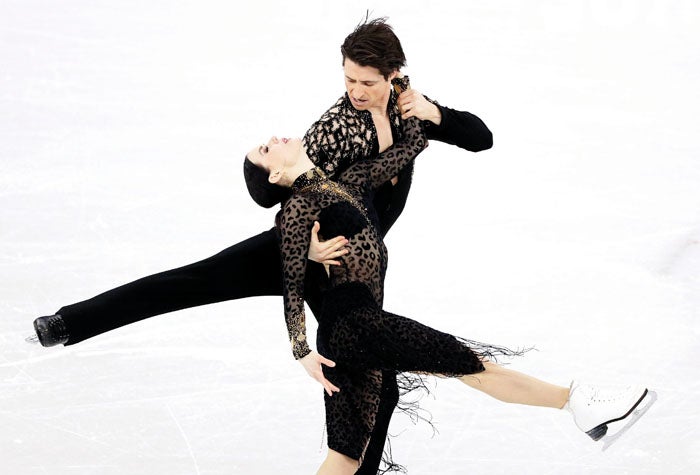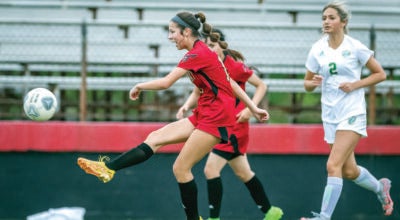Virtue, Moir lead ice dancing after record short dance
Published 12:00 am Monday, February 19, 2018

- Tessa Virtue and Scott Moir of Canada perform during the ice dance, short dance figure skating in the Gangneung Ice Arena at the 2018 Winter Olympics in Gangneung, South Korea, Monday, Feb. 19, 2018. (AP Photo/David J. Phillip)
GANGNEUNG, South Korea (AP) — Tessa Virtue and Scott Moir came out of retirement to win more Olympic gold.
Only the free dance stands in their way.
The Canadian ice dancers broke their own record for a short program at the Pyeongchang Olympics on Monday, piling up 83.67 points with a harmonious, rock-inspired performance.
That score edged their own record set last year by nearly a point, and left them more than a point ahead of their training partners and biggest rivals, Gabriella Papadakis and Guillaume Cizeron.
The French couple appeared a bit thrown off by Papadakis’s costume, which came unhooked at the neck during their program. They held things together despite the wardrobe malfunction and scored 81.93 points, and now will rely on their stronger free dance Tuesday to track down the leaders.
U.S. champs Madison Hubbell and Zachary Donohue were third, two-hundredths of a point ahead of their compatriots, Maia and Alex Shibutani. The third American couple, Madison Chock and Evan Bates, was seventh and in medal contention despite an injury that she aggravated during warmups.
Virtue and Moir won Olympic gold at the 2010 Vancouver Games, then won silver four years later in Sochi, Russia. They stepped away from competition for two years, the taxing grind of more than 15 years spent working together having taken its toll, but returned to make another Olympic run.
They were nearly unstoppable last season, winning the world championship as if they had never been away, but were upset by Papadakis and Cizeron at the Grand Prix Final in December.
They proved Monday that they’re still the team to beat.
Performing to Latin-infused music by the Rolling Stones, Eagles and Santana, Virtue and Moir were in lock-stop from the moment they stepped on the ice. They received level-four marks across the board, highlighted by their dazzling midline step sequence to open the program, and nailed their rhumba sequence on which they were harshly graded in helping Canada win the team event.
The crowd, relatively sparse compared to other figure skating sessions, roared as the three-time world champions skated off to await their scores. The fans roared again when their record numbers were read, and the longest-tenured ice dance team in Canadian history smiled and hugged.
Papadakis and Cizeron followed them onto the ice and received mostly level-four marks, underscored by their in-step rhumba. The only miscue came on their closing straight line lift, perhaps because they were distracted by her emerald and blue dress revealing a bit too much.
Hubbell and Donohue proved their win last month at nationals, after years of frustration, was no fluke with a dramatic performance dragged down only by a small bobble on their synchronized twizzles.
The Shibutanis, who helped the U.S. win team bronze, overcame a shaky start to their performance with a strong second half, including a breathtaking rotational lift to finish.
Meanwhile, Chock and Bates had to push aside the uncertainty caused by her injury to put together a strong opening performance. Chock has a floating bone fragment in her right foot that she’s dealt with all season, and it caused some pain about 30 seconds before their warmup was complete.
She planned to see a doctor later Monday, but doesn’t expect to miss the free skate.
Russian curlers say bronze medalist suspected of doping
PYEONGCHANG, South Korea (AP) — Russian curlers said Monday a coach told them that mixed doubles bronze medalist Alexander Krushelnitsky tested positive for a banned substance at the Pyeongchang Olympics.
Women’s skip Viktoria Moiseeva said the coach “came to tell us the news” late Sunday.
She added the team wanted to comfort Krushelnitsky and his wife and curling partner Anastasia Bryzgalova but “we thought that there are no words to comfort now. We just tried to stay away.”
Russian Curling Federation president Dmitry Svishchev would not confirm the name of the athlete who tested positive, but told The Associated Press that Krushelnitsky tested clean as recently as January 22, the day before he flew to a pre-Olympic training camp in Japan.
Svishchev said it was possible that an athlete’s food or drink had been spiked with meldonium, which was banned in 2016, and suggested rival Russian athletes or Russia’s political enemies could be responsible.





